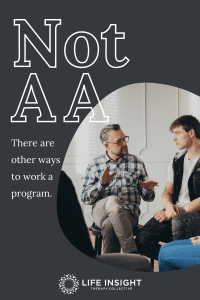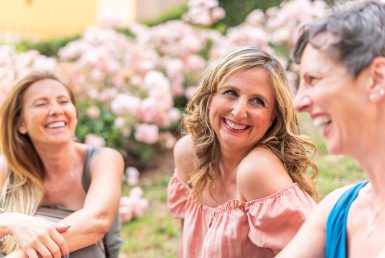Not AA
So you hate AA? There are other ways to work a program
Addiction is a chronic disease requiring effort and accountability to sustain abstinence. Studies show that the longer an individual is able to remain abstinent, the smaller the chance of relapse. Besides individual addiction counseling with a licensed therapist, the most important piece of recovery is involvement in peer support and recovery programs.
The first program most people think of is Alcoholics Anonymous(AA). People who participate in AA work a 12-step process, are asked to admit their lack of control over their addiction, submit to a higher power that they define, and find healing in a sort of spiritual awakening. There are lots of different types of AA groups that appeal to different populations (like secular AA groups, AA just for women, etc.) While AA is proven to be effective for some, it might not be the right fit for everyone.
Luckily, there are other options out there. Anyone seeking recovery support should find a group that works for them, and many people attend multiple types of recovery meetings, as one size doesn’t fit all, and there are different values found in each program.
Some alternate recovery programs:
-
SMART Recovery
SMART Recovery (Self-Management And Recovery Training) is one alternative to AA that focuses on self-empowerment over addiction. SMART Recovery is a sober community that uses cognitive behavioral therapy methods to maintain abstinence from alcohol, drug use, and other addictive behaviors. They offer local in-person meetings, daily online meetings, an online messaging board, and a 24/7 chat room for registered users (it’s free), providing a lot of touchpoints for support.
Face-to-face meetings follow a consistent format worldwide and are led by trained facilitators. Meetings are kept confidential. The program uses a science-based, 4-point approach and a toolbox of worksheets and exercises to help individuals self-manage between visits and therapy appointments.
The four points of treatment are:
- Building and Maintaining Motivation
- Coping with Urges
- Managing Thoughts, Feelings, and Behaviors
- Living a Balanced Life
A SMART Recovery group in the Hinsdale area typically meets on Wednesdays from 7-8:30 pm at Heritage Professional Association but has been moved online as a COVID-19 precaution.
-
LifeRing Secular Recovery
LifeRing is a secular organization focused on helping people with addictions attain sobriety by strengthening their “sober self” and disempowering their “addict self”. There are three basic principles to LifeRing: sobriety, secular, and self-directed. There are no sponsors, higher powers, or steps involved. Participants in this program are asked to find strength within themselves to find recovery.
Individuals who want to participate in this program may join a group and find face-to-face meetings. The website can be used to find online meetings, join email groups, or engage in 1 on 1 messaging through a program called ePals where they are connected via email with a community member for support. Membership is free, and meetings are confidential, guided by a “convener” who lets the conversation flow informally but keeps the meeting’s topic on track.
The closest local in-person group meets at Above and Beyond in East Garfield Park. Meetings occur on Tuesdays from 12-1 pm. Another group meets at 4950 N. Ashland in Chicago, but these meetings have moved online to Zoom during COVID-19 precautions. This group meets Thursdays from 7-8:30 pm. Anyone interested in joining this group can email [email protected] for the Zoom link.
“At its core, LifeRing is about people meeting together, discussing the challenges and successes, and pulling for each other.” – Tup, local LifeRing convenor.
-
Recovery Dharma
If you are interested in a spiritual recovery program that doesn’t involve 12 steps, Recovery Dharma might be for you. Based on the Buddhist practices of meditation, self-inquiry, wisdom, compassion, and community, this non-profit organization is all about finding inner wisdom and discovering your own path. Recovery Dharma welcomes people struggling with all kinds of addictions including eating disorders, codependency, technology, gambling, obsessive patterns or behaviors, drug or alcohol addiction, etc.
The peer-led, community-based movement believes that the Buddhist practices offer a powerful approach to healing from addictions, and that each individual is their own guide in recovery. Recovery Dharma Chicago meetings are available all over the Chicago area, both in-person and online. You can also find them on social media.
-
Women for Sobriety
Addiction affects differently gendered people uniquely and may stem from gender-specific issues. That’s why it can be important to find a recovery program that is specifically created with your gender in mind. Women for Sobriety is an organization that offers inclusive support to all expressions of female identity who are looking for drug or alcohol abstinence support in a women-only environment.
Their self-help group, called the New Life Program, is the first self-help program designed specifically for the needs of women in mind. It is an intentionally positive environment that encourages emotional and spiritual growth in its participants. The program is based on 13 Acceptance Statements which members are asked to read through and think about every morning, meditate on during the day, and reflect on at night.
1.I have a life-threatening problem that once had me.
I now take charge of my life and my well-being. I accept the responsibility.
2. Negative thoughts destroy only myself.
My first conscious sober act is to reduce negativity in my life.
3. Happiness is a habit I’m developing.
Happiness is created, not waited for.
4. Problems bother me only to the degree I permit.
I now better understand my problems. I do not permit problems to overwhelm me.
5. I am what I think.
I am a capable, caring, compassionate woman.
6. Life can be ordinary or it can be great.
Greatness is mine by a conscious effort.
7. Love can change the course of my world.
Caring is all-important.
8. The fundamental object of life is emotional and spiritual growth.
Daily I put my life into a proper order, knowing which are my priorities.
9. The past is gone forever.
No longer am I victimized by the past. I am a new woman.
10. All love given returns.
I am learning to know that I am loved.
11. Enthusiasm is my daily exercise.
I treasure the moments of my New Life.
12. I am a competent woman, and I have much to give life.
This is what I am, and I shall know it always.
13. I am responsible for myself and for my actions.
I am in charge of my mind, my thoughts, and my life.
Women for Sobriety in-person group meetings have been temporarily moved online. There is also an online community available with a 24/7 messaging board, and a peer-led phone support system for one-on-one relationships. The Women for Sobriety community also extends to social media, on Twitter, Instagram, Pinterest, and Facebook pages.
-
The Phoenix
A sober active community that is focused on community and fitness, The Phoenix is a free group, requiring only 48 hours of sobriety for membership. The Phoenix takes a different approach to recovery, using fitness and personal connection to foster healing, overcome addiction, and help participants rise to their potential.
They offer activities from yoga to weightlifting in cities all over the country, virtual classes, online community challenges, and on-demand workout videos that can be done anytime. They are also active on social media for sober living tips, workshop notifications, and community updates. The Phoenix has over 38,000 members in its all-inclusive community that welcomes all levels of physical fitness.
-
SOS
Secular Organizations for Sobriety rejects the spiritual element of recovery programs. SOS is a network of autonomous recovery groups across the country and is open to everyone. The group prioritizes self-empowerment, encouraging members to achieve and maintain their own sobriety. SOS supports healthy skepticism and uses a science-based approach that does not require submitting to a higher power or encourage “sponsor” relationships.
SOS offers in-person and online meetings that are searchable upon registration on the SOS website. Additionally, there are a lot of valuable resources available for free, serving both the person involved in recovery and their family or friends.
The guidelines for sobriety encouraged by SOS are:
- To break the cycle of denial and achieve sobriety, we first acknowledge that we are alcoholics or addicts
- We reaffirm this daily and accept without reservation the fact that as clean and sober individuals, we can not and do not drink or use, no matter what.
- Since drinking or using is not an option for us, we take whatever steps are necessary to continue our Sobriety Priority lifelong.
- A quality of life, “the good life”, can be achieved. However, life is also filled with uncertainties. Therefore we do not drink or use regardless of feelings, circumstances, or conflicts.
- We share in confidence with each other our thoughts and feelings as sober, clean individuals.
- Sobriety is our Priority, and we are each responsible for our lives and sobriety.
These are just a few of the non-AA options out there, although there are many more groups dedicated to maintaining sobriety in all different types of communities. Regardless of which recovery group you choose to join to support you in your sobriety, there is healing and community available for everyone.
Join Our Community.
Sign up for our quarterly newsletter with practice news, timely resources, staff highlights, and other helpful tidbits!
Recent Posts







